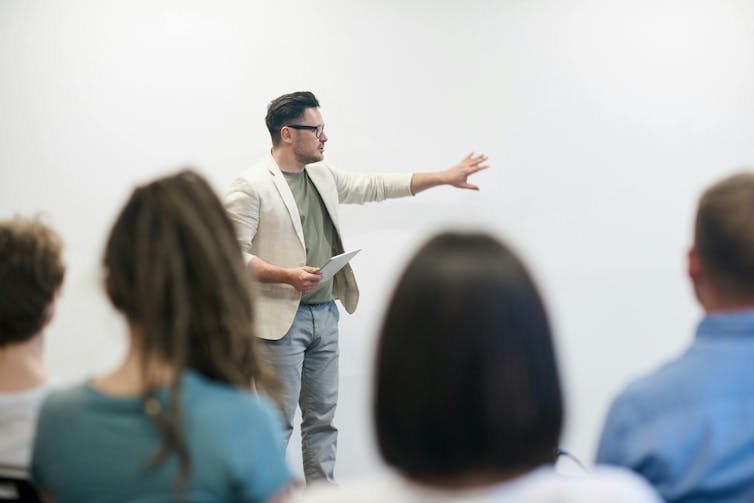Source: The Conversation (Au and NZ) – By Joseph Crawford, Senior Lecturer, Management, University of Tasmania

The federal government has released the final report on a Universities Accord. Taking more than a year to prepare, it is billed as a “blueprint” for reform for the next decade and beyond. It contains 47 recommendations across student fees, wellbeing, funding, teaching, research and university governance. You can find the rest of our accord coverage here.
The Universities Accord final report hopes more Australians will get a tertiary education. This calls for a huge increase in the numbers of university students: from 860,000 today to more than 1.8 million by 2050.
To achieve this, Australia will need more students from currently underrepresented backgrounds going to university. The report also notes the importance of keeping students at uni once they get there.
As the interim report noted last year, “too few” Australians are finishing their university degrees, with completions of a first bachelor degree “at their lowest since 2014”.
All of this is happening at time when the nature of university study is changing. Gone are the days when students spent all their time on campus, in lecture halls and tutorial groups with teachers and other students. University life is increasingly spent online.
This makes it harder to ensure students have a sense of belonging, which in turn impacts upon their wellbeing and capacity to succeed with their studies.
Read more:
Universities Accord final report: what is it, and what does it recommend?
What is belonging and why is it so important?
A significant part of this picture is students’ sense of belonging. Humans have a psychological need to have mutual and meaningful connections with others. A low sense of belonging has been linked to lower self-esteem, greater mistrust, feeling rejected and mental health issues including depression and anxiety. This can make it harder for students to persist with and stay resilient about completing their studies.
The accord final report notes how important it is for universities to ensure learning environments are welcoming and inclusive, saying students need to:
feel a sense of connection and belonging to their university, which can have positive impacts on wellbeing, student transition and retention and academic outcomes.
But recent research suggests belonging is a significant issue for Australian students and universities. The 2022 national student experience survey found only one in two (46.5% of undergraduates and 44.7% of postgraduates) students felt they belonged at university.

Armin Rimoldi/ Pexels, CC BY
The move online makes things more difficult
In a 2023 study we used machine learning (or artificial intelligence) to analyse data from the student experience survey on more than one million students between 2013 and 2019. We looked at what factors helped students have a sense of belonging at their university.
We found the most important demographic feature contributing to a sense of belonging was whether the students studied online or on campus. This was more important than gender, age, where they were up to in their degree, or the language they spoke at home
Unfortunately, the momentum post-COVID is towards more online learning, not less. As the final report notes, the pandemic saw physical university spaces shut down and there has been a “profound shift” towards virtual classrooms.
In 2023 online learning grew by 34% in US universities and face-to-face learning declined by 24%. It is likely Australia shares similar growth.
The accord report notes the growth of technology to communicate with students, use of artificial intelligence in curriculum and support services (such as chatbots), “can affect students’ sense of belonging to their universities”.
In this sense, technology has undermined a formerly unique advantage of campus life.
The review also notes many students also need to work to fund their studies, which also makes it difficult for them to spend time on campus, even if their courses are in-person.
How can we facilitate belonging?
So if we can’t necessarily rely on traditional in-person approaches, what can universities do to help students feel as though they belong?
During the pandemic, universities began to grapple with this issue. Some approaches included informal peer-to-peer time before online classes and peer-to-teacher time afterwards.
This was to mimic an on-campus class waiting space and catching the teacher before they leave the lecture theatre. Initial feedback from students and staff about these measures was positive.

Fauxels/ Pexels, CC BY
Mentoring, meeting and working together
In preparing the final report, the Universities Accord review panel commissioned 19 reports on specific issues. In my report for the panel on belonging, I suggested some other approaches universities could take to help students feel connected. These include:
1. a peer mentoring system: formal mentoring between different year group students, such as pairing first and last year students, can help younger students in particular see their way through difficult patches and understand they are not alone
2. keeping in touch with teachers: university often means having different teaching staff for different subjects and year levels, which is necessary to support academic specialisation. But universities should look at ways students can maintain contact with the same academic staff throughout their studies, to provide further opportunities for mentorship and connection
3. orientations: universities should have compulsory mandatory orientations or inductions to create space for students to make their first university friends. These should preferably be in person and at least be in the first semester, but reinforcement each semester can also help
4. teamwork, not group work: research suggests “teamwork” skills matter a lot for belonging, but “group work” does not. Group work is more about multiple people being involved in a task, such as a group assessment. Team work is about team members having skills to communicate clearly, plan together, solve conflicts and collaborate. Universities can train academic staff in creating collaborative learning environments online. This means teachers can then facilitate high-quality team interactions before setting group-based assessments
5. structuring opportunities to meet in person: if courses are all or mostly online, universities should look at onsite intensive sessions, informal but mandatory events such as guest speakers or assessments done face-to-face. While these will be logistically challenging – particularly in regional and remote learning – they can create important opportunities for students to connect
6. encouraging students to come to campus: there is a growing number of students studying online in the city they live in. These students ought to be encouraged to study in the campus library or attend a free food event, even if they are considered “online” or “distance” students. And when procuring on-campus shops and cafes, universities can also ensure they have features that encourage connection and a social atmosphere. These might include plenty of tables, places to meet, internet connections and spaces to work.
The accord’s final report places contains ambitious targets to see more Australians educated at tertiary level. This is welcome but we need to acknowledge the nature of university life is changing rapidly. Universities will need to change their approach to ensure students feel like they are a part of a something and not just on the receiving end of a pre-recorded lecture or online task.
Read more:
Help to settle in and friendships beyond class: what makes students feel like they belong at uni
![]()
Joseph Crawford does not work for, consult, own shares in or receive funding from any company or organisation that would benefit from this article, and has disclosed no relevant affiliations beyond their academic appointment.
– ref. Universities Accord: almost 50% students don’t feel like they belong at uni. We need to fix this if we’re going to double enrolments – https://theconversation.com/universities-accord-almost-50-students-dont-feel-like-they-belong-at-uni-we-need-to-fix-this-if-were-going-to-double-enrolments-224249



